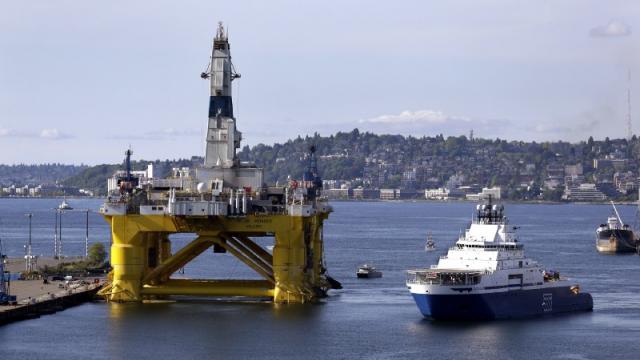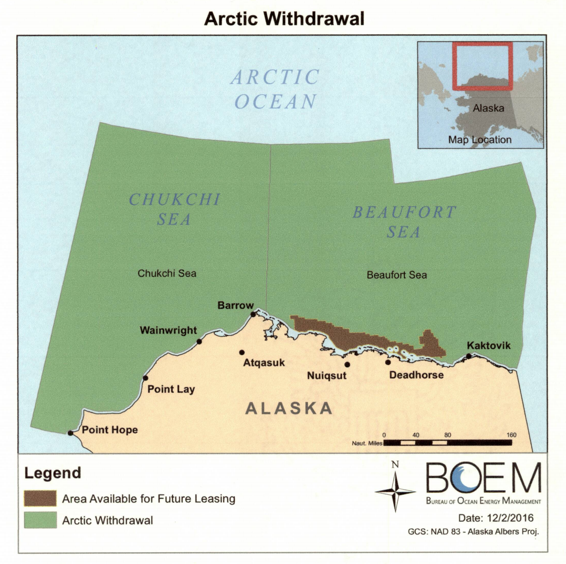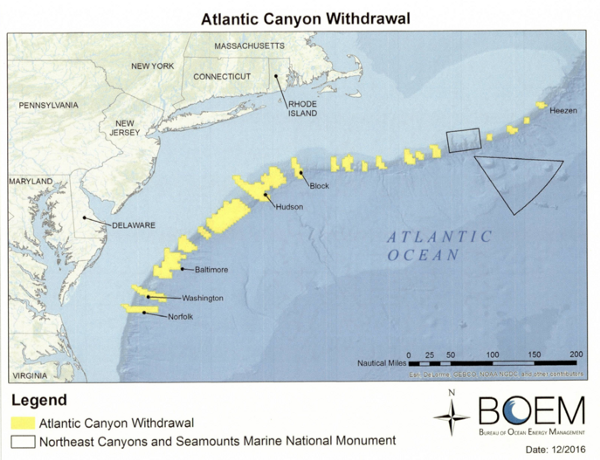
The Obama administration announced Tuesday that 98 percent of U.S.-controlled Arctic waters (115 million acres) will be permanently withheld from any future oil and gas leasing. In addition, 3.8 million acres of underwater canyon along the Atlantic coast will be protected from oil and gas leasing.
Simultaneously, the Canadian government announced it will withdraw all oil and gas leases in Canadian Arctic waters. The two countries will also begin work to phase out the use of Heavy Fuel Oil (HFO) in the Arctic and committed to an HFO ban to the International Maritime Organization.
“Today, in partnership with our neighbors and allies in Canada, the United States is taking historic steps to build a strong Arctic economy, preserve a healthy Arctic ecosystem and protect our fragile Arctic waters, including designating the bulk of our Arctic water and certain areas in the Atlantic Ocean as indefinitely off limits to future oil and gas leasing,” President Obama said in a statement.
Environmentalists applauded the move, which they suggest is part of Obama’s efforts to shore up his own environmental legacy before the Trump administration takes over. So far, Trump cabinet nominees have strongly represented fossil fuel interests, including the nominee for Secretary of State, Exxon CEO Rex Tillerson. President-elect Trump has repeatedly pledged to increase offshore drilling.
“We know now, more clearly than ever, that a Trump presidency will mean more fossil fuel corruption and less governmental protection for people and the planet, so decisions like these are crucial,” Travis Nichols, a spokesperson for Greenpeace, said in a statement. “President Obama should do this and more to stop any new fossil fuel infrastructure that would lock in the worst effects of climate change.”
The action will not affect current leases in the Arctic, nor will it apply to state-controlled waters.
Staying Power
Unlike some of President Obama’s other executive actions or agency rules, the new administration will have trouble reversing this one. For instance, a new Department of the Interior rule, which seeks to protect 6,000 miles of streams and 52,000 acres of forests from coal mining run-off, is likely to be among the first acts Congress will seek to overturn in the new year. Likewise, a moratorium on new coal mining leaseson public lands and multiple efforts to reduce methane leaked during natural gas extraction are expected to be on the chopping block.
Keeping fossil fuels from being burned — whether through regulation or through market forces — is the only way people can hope to avoid the most catastrophic effects of climate change.
Doing that through the regulatory process has proven difficult. The current administration has been subjected to numerous lawsuits challenging its authority to reduce pollution.
Obama specifically noted the environmental dangers of drilling for oil and gas offshore in his statement Tuesday. “[These actions] reflect the scientific assessment that, even with the high safety standards that both our countries have put in place, the risks of an oil spill in this region are significant and our ability to clean up from a spill in the region’s harsh conditions is limited,” he said.
“By contrast, it would take decades to fully develop the production infrastructure necessary for any large-scale oil and gas leasing production in the region — at a time when we need to continue to move decisively away from fossil fuels.”
In this case, Obama was able to act under the 1953 Outer Continental Shelf Lands Act, which outlines how the offshore leases are carried out. The law has a provision that allows presidents to block areas from drilling — which has been used before, but only with time limits. This appears to be the first time a president has used the law to permanently protect waters from oil exploration.
Obama designated the first-ever Atlantic marine monument in September, but Trump is already being pressured to remove that protection.
Not so the case now, for these Atlantic canyons, which the administration said have “critical and irreplaceable ecological value” are located off the shores of Maryland and north to the Canadian border. “The Atlantic canyons themselves, majestic geologic features carved by glacial runoff or by rivers that once flowed overland and were submerged by rising seas after the last ice age, have incredible ecological importance. The massive underwater canyons are home to many species and have been the subject of scientific exploration and discovery since the 1970s,” the administration said. There is no legal precedent for challenging this action, and experts suggest it would take years — or even decades — to determine how and whether it could be legally revoked.
“This is a win for all who spoke out in support of putting our oceans off limits to oil extraction once and for all,” said Rachel Richardson, director of Environment America’s Stop Drilling program. “President Obama just gave us an incredible victory in the fight to protect our oceans and climate from reckless offshore drilling and spilling.”
A Pivotal Moment
In that sense, Tuesday’s move to curb offshore drilling is one of the strongest taken by the Obama administration, which has been at times inconsistent in its approach to addressing climate change and reducing environmental risk.
In the Bureau of Ocean Energy Management’s initial draft of its latest five-year plan, which sets where offshore leases will be offered, parts of the southeast Atlantic were considered for offshore drilling. While state governors mostly supported the plan, communities up and down the coast were catalyzed to pass anti-drilling resolutions.
According to Oceana, an advocacy group, more than 120 towns, cities, and counties off the coast of Virginia, North Carolina, South Carolina, Georgia, and Florida, opposed offshore drilling and/or seismic testing, a disruptive oil exploration technique that is believed to harm sea life, including endangered whales, sea turtles, and commercially farmed fish populations.
“These individuals and groups understand that nearly 1.4 million jobs and more than $95 billion in gross domestic product are at risk if dangerous oil activities proceed,” Jacqueline Savitz, Oceana’s senior vice president for the United States, said in a statement.
Under that community pressure, the southeast Atlantic was scrapped from BOEM’s final five-year plan — although that region was not protected in Tuesday’s action. Meanwhile, private companies continued to pursue seismic testing in the region.
Oceana urged the administration to reject all seismic testing permits.
“If offshore drilling is off the table for the foreseeable future, permits for seismic blasting should be denied,” Savitz said. “We are hopeful that President Obama will deny all pending permits for seismic airgun blasting off the East Coast.” Drilling in some areas of the Chukchi and Beaufort seas had also already been removed from the five-year plan. Drilling in the Gulf of Mexico, which has caused billions of dollars in damages and results in frequent, ongoing spills, will continue.
One Last International Agreement
Critical to the announcement Tuesday was that it was paired with a similar announcement from the Canadian government and a pledge to work towards reducing pollution in the Arctic, which is often cited as ground zero for climate change.
Obama and Canadian Prime Minister Justin Trudeau had already pledged to protect at least 17 percent of Arctic land areas and 10 percent of marine areas by 2020, but they promised in the spring that further protections were to come.
As the Arctic continues to experience unprecedented melting — and is increasingly exposed to human activity and pollution — it becomes more and more fragile. Shipping traffic through the Russian Northern Sea Route, for instance, increased 14-fold between 2005 and 2013. Last year, a cruise ship embarked on the first-ever luxury voyage through the Northwest Passage.
It’s this increased traffic that makes the heavy fuel oil component of Tuesday’s announcement so important. HFO is a heavy, sticky, dense type of oil — and it is commonly used in cargo vessels, since it is cheaper than diesel. According to the Arctic Council, a coalition of the countries and peoples bordering the Arctic, an HFO spill is the single greatest threat to the Arctic’s marine environment.
A cargo ship burns up to 100 tons of HFO each day and can be at sea for over a month — meaning a ship could have nearly a million gallons of HFO when it starts a voyage. (In terms of spills, tankers carrying oil as their cargo can obviously be carrying much more.)
But while it is certainly a significant step forward for the United States and Canada to be making Arctic protection commitments, the big question is: What will Russia do? Russia continues to explore for and extract oil out of the Arctic, likely with significantly fewer environmental protections and regulations. (It is difficult to know exactly what is happening in the Russian-controlled Arctic, as the country releases little information on its Arctic program.) Even assuming an HFO ban makes it to the International Maritime Organization, environmentalists and Arctic protectors will likely face a big fight to get it passed.
3 WAYS TO SHOW YOUR SUPPORT
- Log in to post comments

















